Fastest external SSD of 2025
We've tested the fastest external SSDs for speedy storage expansion
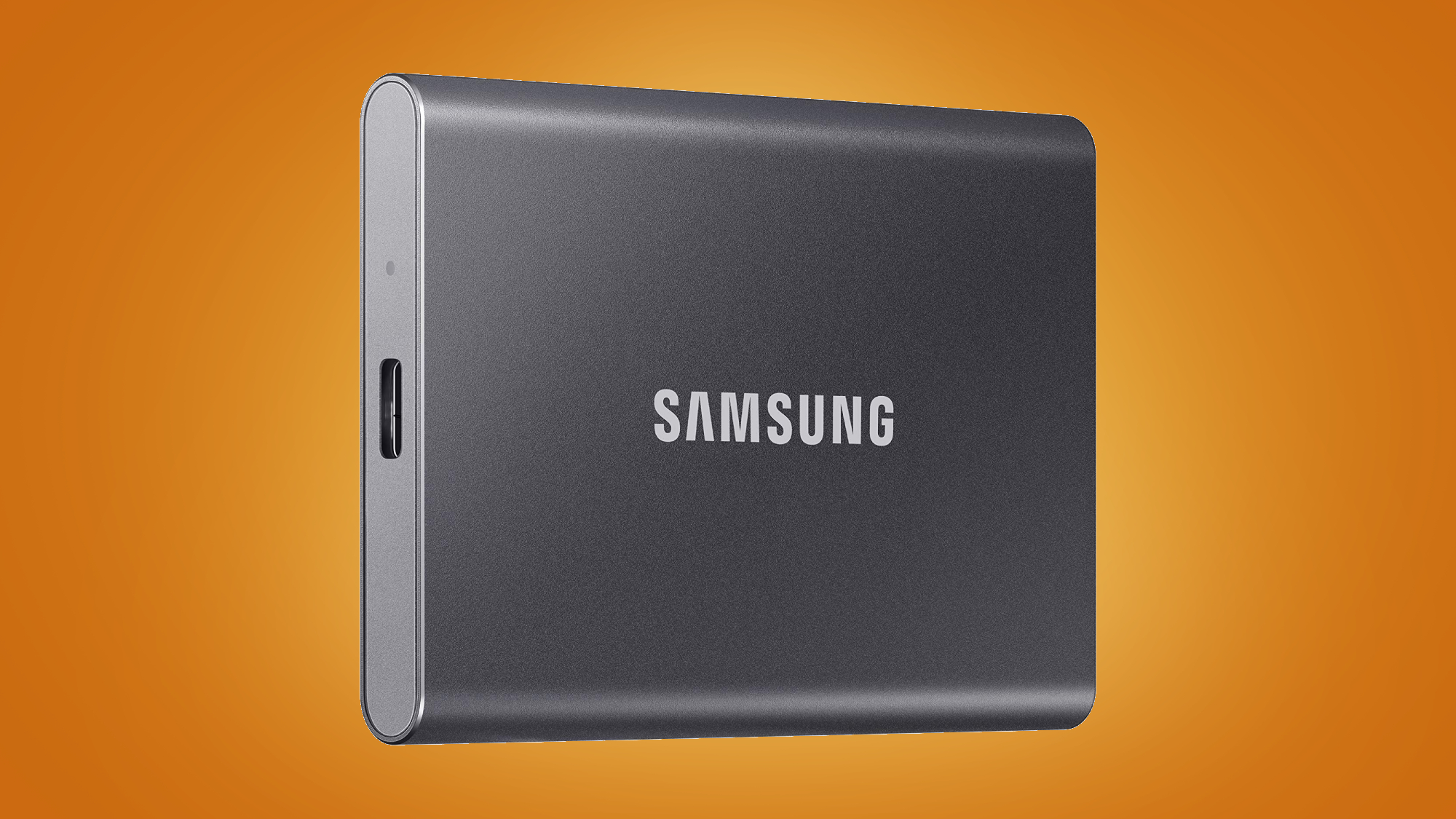
Sign up for breaking news, reviews, opinion, top tech deals, and more.
You are now subscribed
Your newsletter sign-up was successful
The fastest external SSDs are essential for anyone transferring large amounts of data while on the go. In this guide, we'll focus on fast solid-state drives that adhere to NVMe standards for best performance.
For most people, we recommend the Adata SE920 as the fastest external SSD overall. We found this drive offered excellent transfer speeds during our review, with a range of capacities available, and USB4 connection for that all-important speed boost. Check out our review below, as well our favorite fast alternatives.
Alongside the best SSDs and best portable SSDs, for more speedy storage solutions, we've also tested out all the fastest SSDs, fastest hard drives, and fastest external HDDs around.
And for more savings on storage, right now we're tracking down the best Prime Day SSD, hard drive, portable SSD and external HDD deals around.
Fastest external SSD overall
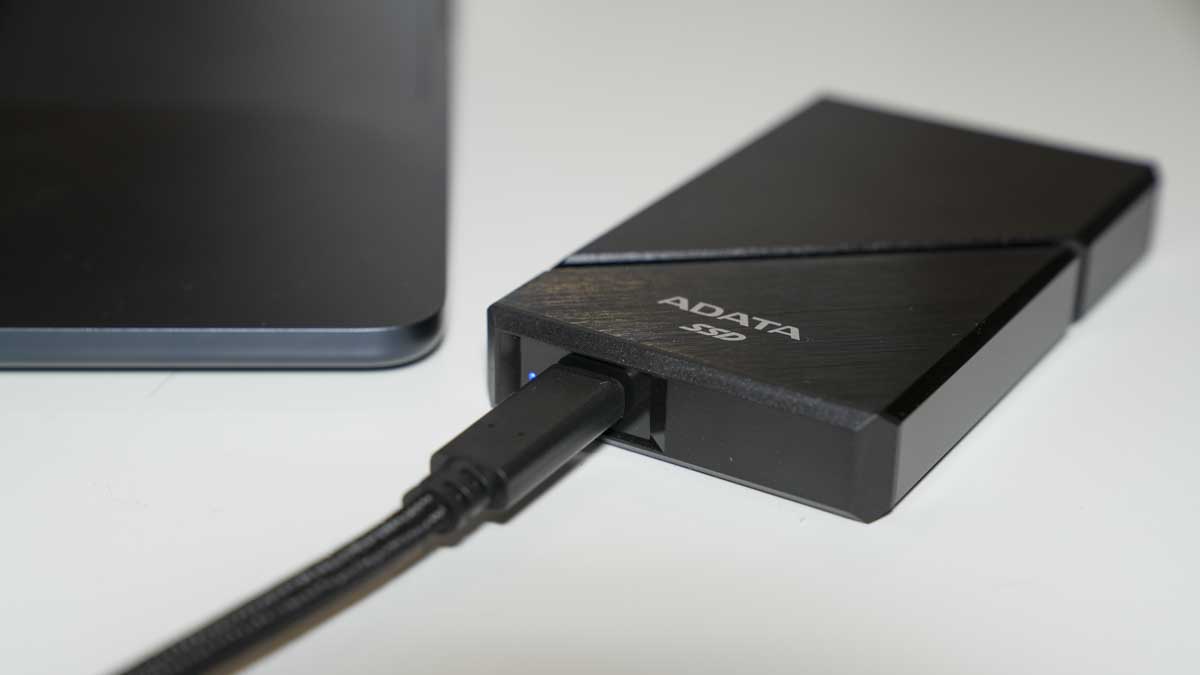
Reasons to buy
Reasons to avoid
The Adata SE920 scored incredibly well for portability and for speeds, making it suited for all rapid data transfer needs and very difficult to beat. We registered reads of 3,201MB/s and writes of 3,045MB/s in testing with AJA System Test Light. However, we needed to turn off the write cache to achieve those write speeds. With these sorts of speeds, handling large files and demanding apps is effortless.
There are limits to the SSD. With up to 2TB storage capacity, this won’t fit the needs for heavy creative work, large video files, or other media (and lots of it). If you’re running Mac or Linux, you are going to need to perform some manual setup to get the drive working, which won’t appeal to those who want plug-and-play. And while the full metal exterior feels premium, other areas, such as the cooling fan mechanism, are less well-constructed.
For sheer speed from a portable SSD, the Adata SE920 excels.
Read our full Adata SE920 external SSD review
Fastest external SSD for Mac
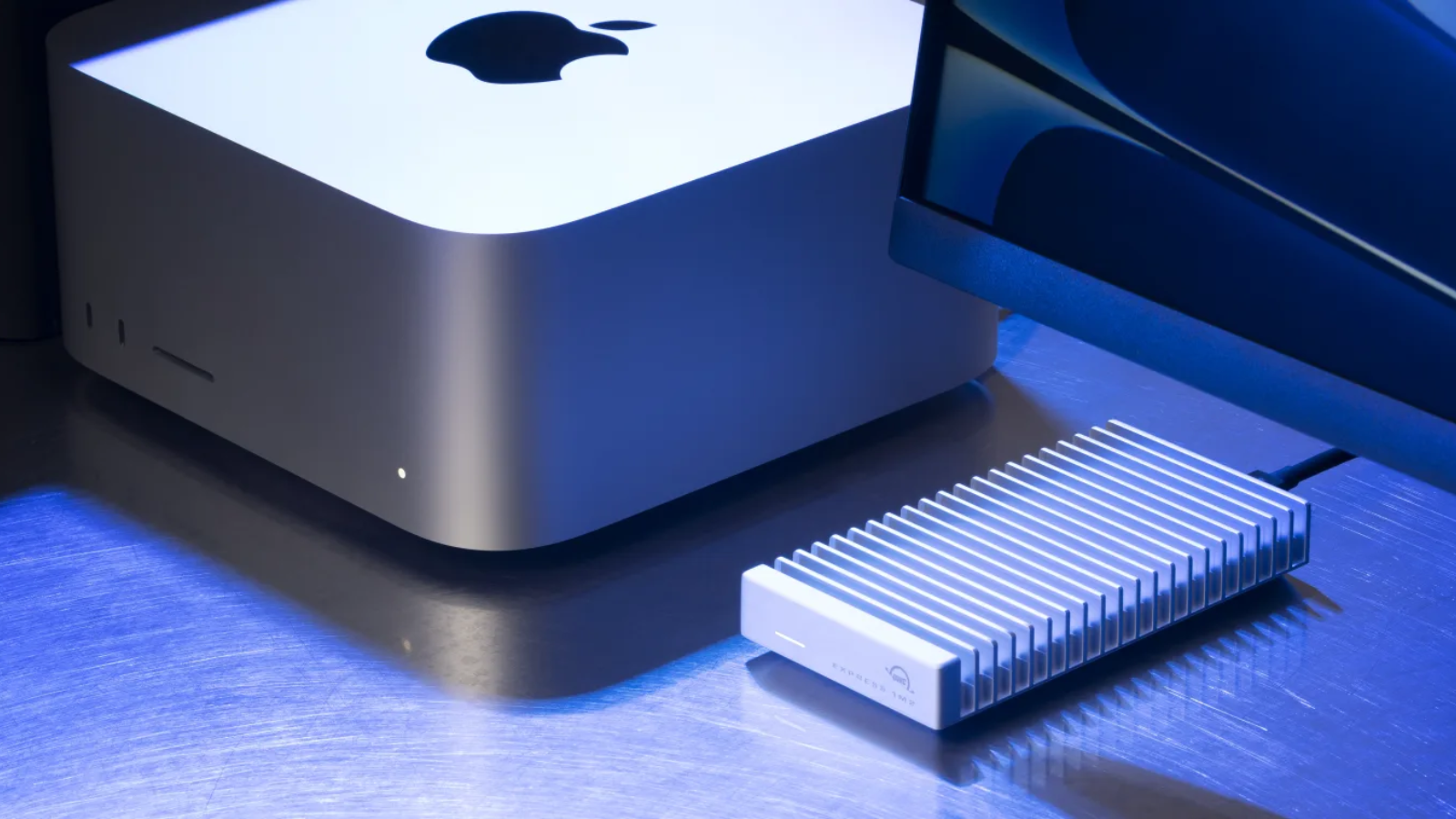
Reasons to buy
Reasons to avoid
There's little better than the OWC Express 1M2 for macOS devices, and it's made specifically to host your content and media. This device boasts speeds of up to 3,151MB/s and it's got a great Apple-friendly interface – with content creation and media the main focus. Better yet, it has an up-to 8TB storage capacity. Creators will have no trouble storing and managing large video, image, and files. But it’s just as suitable for high-volume data storage and back-up in offices and home offices.
The external drive is constructed from what the company calls ‘aircraft-grade aluminum’, and features USB-C, USB4, and Thunderbolt connectivity. You can also choose between DIY and pre-built models, letting you pick the best configuration and future-proofing your set-up. The Express 1M2 is available in 1TB, 2TB, 4TB, and 8TB models, and you can choose between NVMe M.2 2230, 2242, and 2280 SSD.
Read our full OWC Express 1M2 review
Fastest budget external SSD
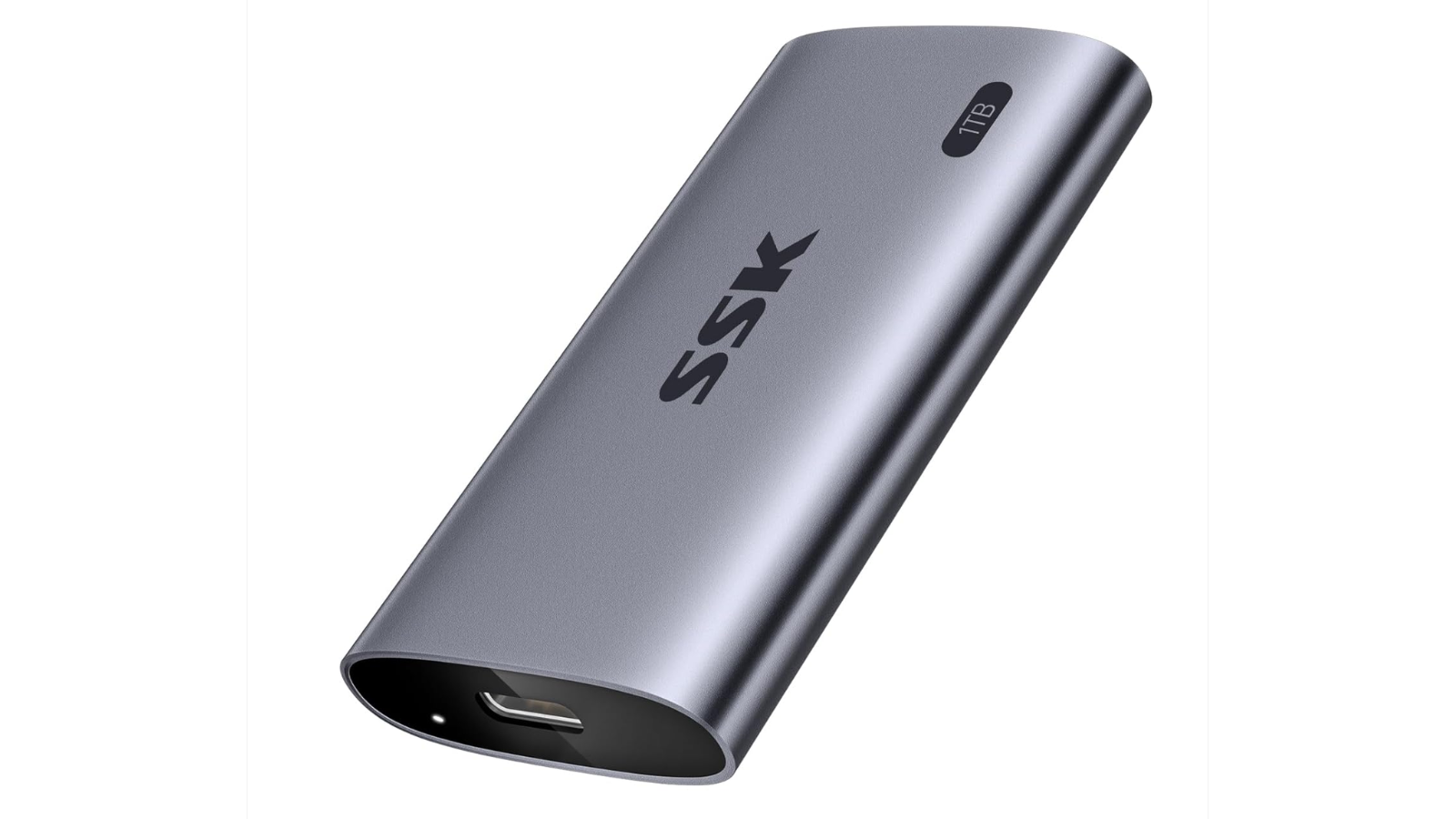
3. SSK 1TB portable SSD
Reasons to buy
Reasons to avoid
For under $100, the SSK 1 TB SSD seems to be one of the best-value SSDs for speed that you can buy. We haven't tested this specific device, but it's generally well a strong backing on Amazon.
With speeds more than 2000MB/s, it's available in 500GB, 1TB, 2TB and 4TB configurations – with the biggest one reaching more than $280 at the time of writing. The company also suggests the SSD can maintain a transfer speed of 1.44GB/s even for a 250GB file. Overall, it appears to be a good all-rounder for data storage and back-up.
If you’d rather get a budget SSD from a trusted brand that’s been reviewed by us, we recommend the Sandisk Extreme Pro V2. Like the SSK, this is an all-rounder. It’s also one of the fastest rugged external SSDs you can get, and costs a little over $100.
For more details, check our Sandisk Extreme Pro V2 1TB external portable SSD review.
Fastest rugged external SSD
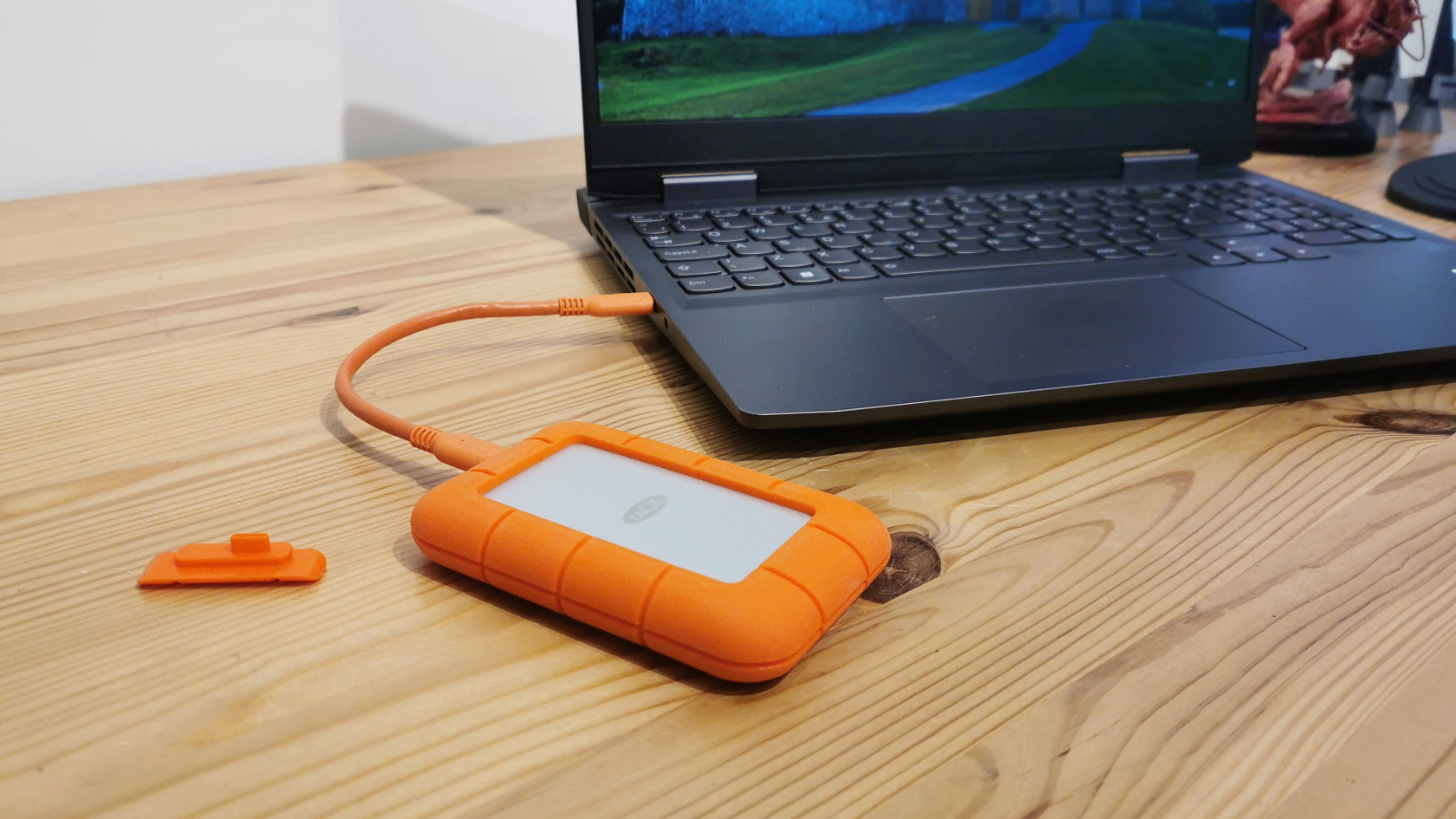
Reasons to buy
Reasons to avoid
LaCie's rugged devices are well known for their durability and toughness, and the LaCie Rugged Mini is the best choice for anybody working on the move. This SSD comes in various sizes including 1TB, 2TB, 4TB and 5TB, with the 2TB model hitting sequential read/write speeds of 2049MB/s and 1842MB/s when we tested it. Connected to a USB 3.2 Gen 2x2 port, it’s possible to hit 2,000MB/s transfer speeds.
For added peace of mind when transporting the external SSD, it boasts a 4ft (1.2m) drop resistance and a crush resistance of one ton. It also has a P54-rated for water and dust protection - so you’re protected against the rain, but not much else. The unit is also highly dependent on a single rubber plug to protect the ports.
If you’re looking for higher IP and MIL-STD ratings, and you’re happy to sacrifice some external SSD speeds, see our round-up of the best rugged hard drives.
Read our full LaCie Rugged Mini SSD review
Fastest external SSD for capacity
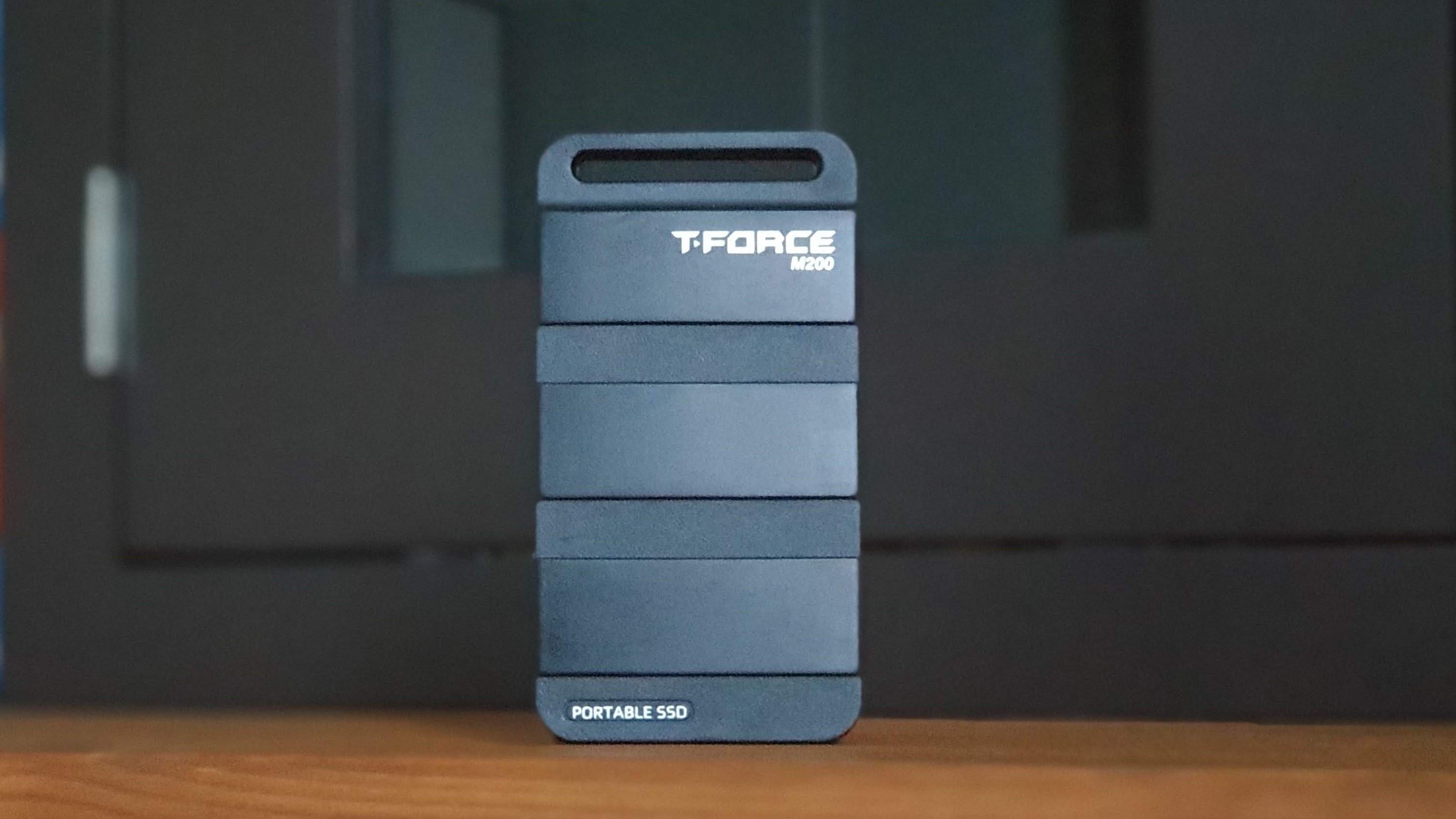
Reasons to buy
Reasons to avoid
The Teamgroup T-Force M200 is an 8TB monster SSD with great speeds, making it an ideal device if you need something portable, large-scale, and high-performing. In fact, only the OWC Express 1M2 can match it in terms of size. The only downside is that the 8TB version is very expensive, with no configurations available below 2TB.
With a maximum storage capacity of 8TB, the Teamgroup T-Force M200 is matched only by the Mac-centric OWC Express 1M2 when it comes to our fastest external SSD recommendations. We went hands-on with the 4TB version, while a 2TB model is available if your capacity needs are smaller. Testing via USB-C on a Windows 11 proved slower than we’d like. CrystalDiskMark: benchmarking results showed read/write speeds of 986MB/s and 1036MBps (write). However, the company states read/write speeds of up to 2GB/s are possible. So, to get the absolute best performance from the T-Force M200, we strongly recommend making sure you can have (or can add) USB 3.2 Gen2x2 functionality to your set-up.
Read our full Teamgroup T-Force M200 4TB external SSD review
Fastest secure external SSD
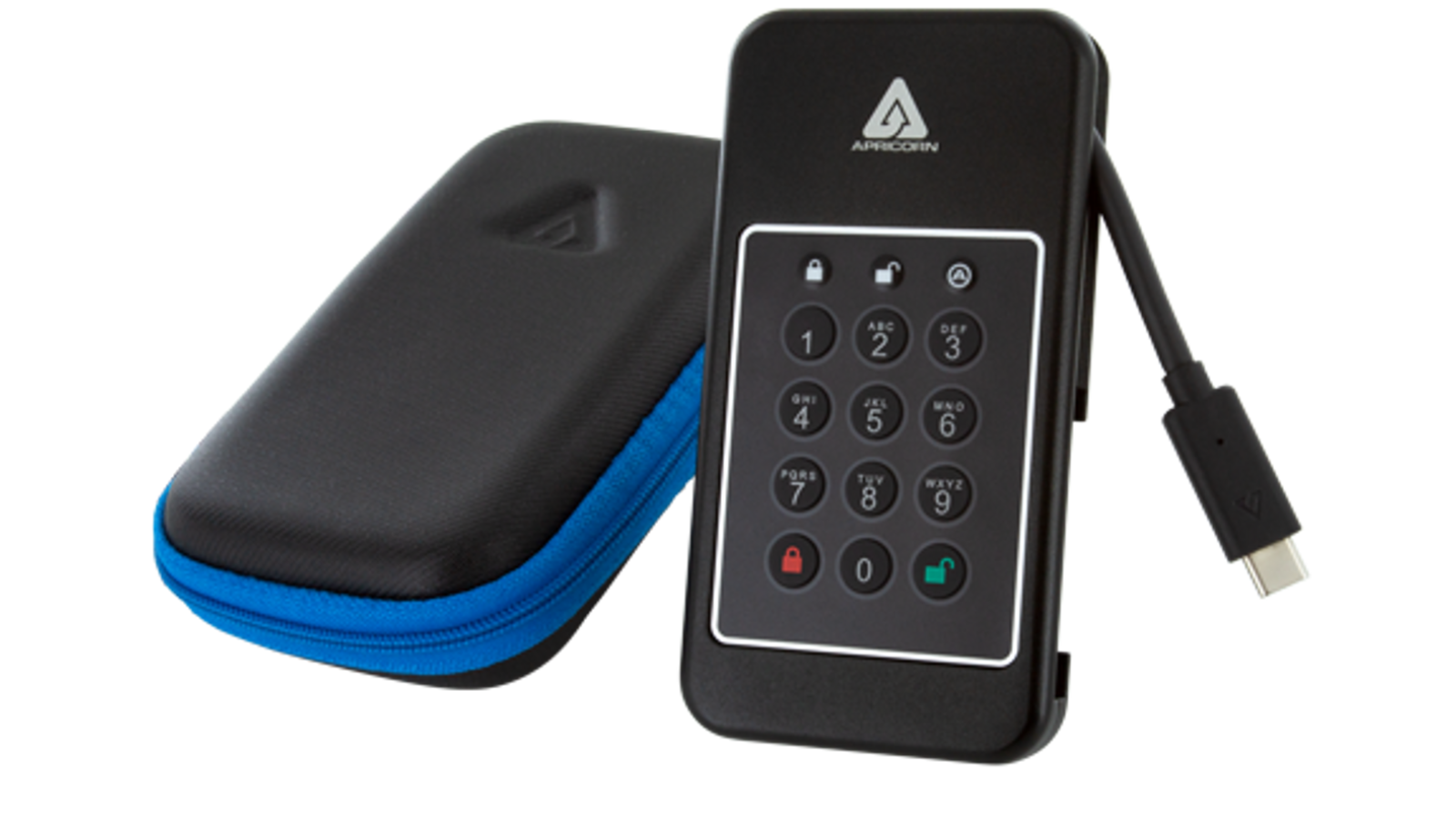
6. Apricorn Aegis NVX
Reasons to buy
Reasons to avoid
Apricorn's Aegis NVX is a security-conscious and rugged portable SSD that's packed full of protections to ensure your data is secure from physical as well as cyber threats. Not only does it boast 256-bit AES XTS encryption, software-free setup, and onboard keypad authentication, but this SSD made from aircraft-grade aluminum also has an IP68 rating to withstand a variety of environmental and physical threats.
It seems like data is more valuable than gold or oil these days, so it’s absolutely vital to store, back-up, and protect it in a device built for security. Features also include defense against brute-force attacks, admin and user modes, and a self-destruct PIN for when you fear the device has been lost or stolen.
What the Aegis NVX lacks is a good connectivity range. The interface is only USB-C, but is compatible across Windows, Mac, Linux, Android, and Symbian.
When it comes to speed, Apricorn’s secure device has an advertised transfer speeds of 1000MB/s. We’ve requested a review sample to see how well it holds up during real-world testing.
For full security details, see the official Apricorn Aegis NVX site.
Fastest portable external SSD
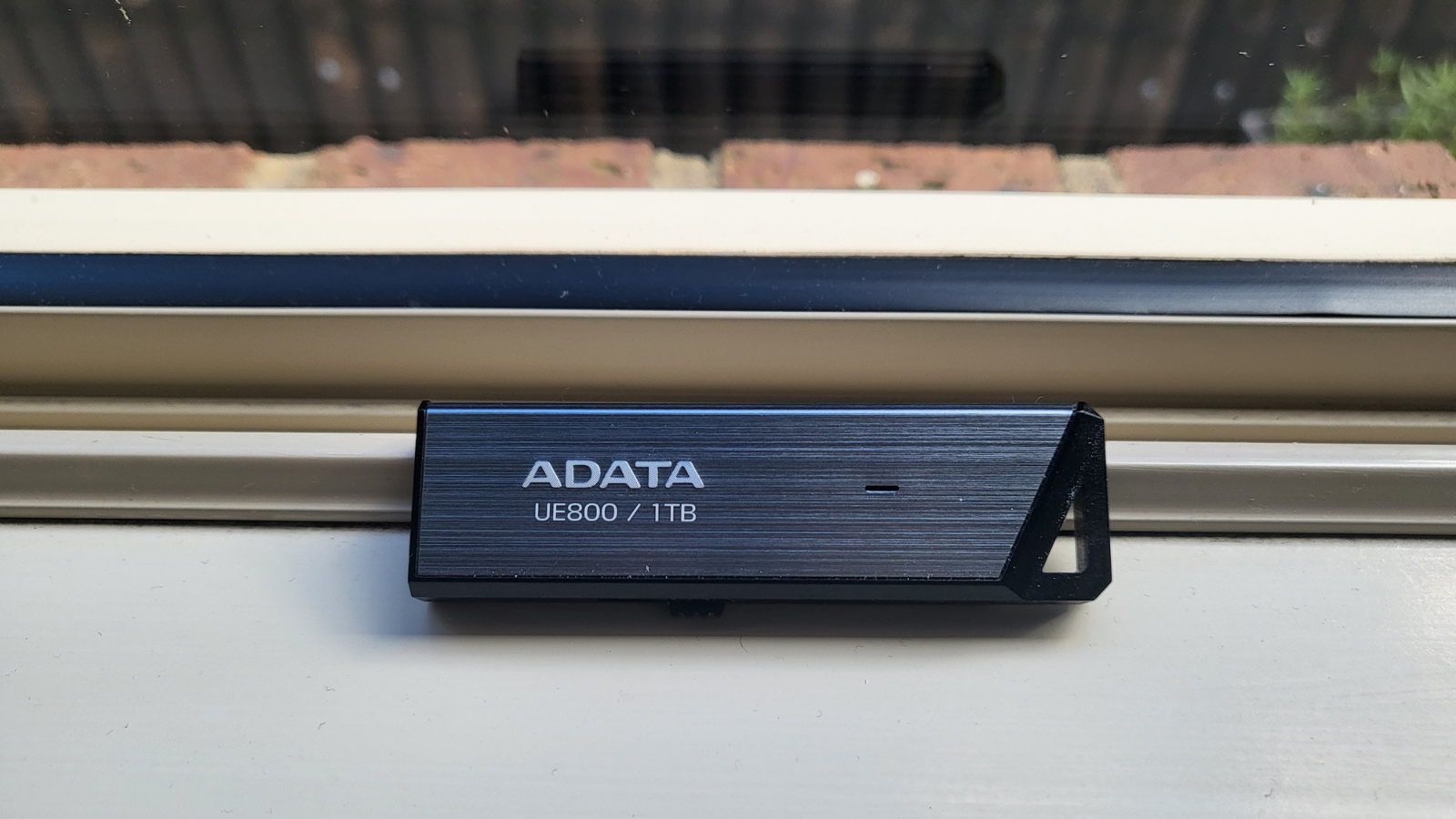
Reasons to buy
Reasons to avoid
The Adata Elite UE800 is one of the smallest, lightest and fastest SSDs out there, weighing just 13g and measuring just 73 x 21.3 x 8.9mm in size. It even has a loop for attaching a lanyard. The manufacturers claim it can reach reads and writes of up to 1000MB/s, which was reflected in our own internal benchmarking. For example, in our CrystalDiskMark test, the Elite UE800 managed read/write speeds of 1074MB/s and 1001/MB/s.
Unfortunately, for a device this small, there’s no IP rating. Having said that, adding extra caps and rugged features would mess up the simple, pop-out functionality of the drive. But while it’s perfect for portability, we’d recommend making sure it’s safe and secure in transport.
Read our full Adata Elite UE800 1TB review
Fastest external SSD: FAQs
Why are external SSDs slower than internal SSDs?
The fastest SSD we’ve tested is the Crucial T705 which reaches read/write speeds of 14.1GB/s and 12.6GB/s respectively using the popular CrystalDiskMark test. In comparison, the fastest external SSD can only deliver 3.8GB/s and 3.05GB/s with the same software.
The performance disparity between internal and external SSDs stems from their connection methods to the computer. Internal SSDs utilize interfaces such as SATA, PCIe 3.0, PCIe 4.0, or even PCIe 5.0, which enable SSD drives to operate at their native speeds by providing a direct motherboard connection.
Conversely, external SSDs connect through USB or Thunderbolt ports - the standard external interfaces on computers - which create a bottleneck. Historically, these have been slower than internal connections. However, as technology advances, this gap is closing.
Modern external SSDs connected via USB are typically limited to 10Gbps, or 20Gbps with USB 3.2 2x2. Thunderbolt 3 SSDs are capped at a theoretical 40Gbps, translating to around 2900MB/s in practical use. USB4 SSDs improve upon this with up to 3800MB/s real-world performance.
The upcoming Thunderbolt 5 promises to further reduce the gap with 80Gbps, surpassing many internal SSDs’ capabilities. Thus, while SSD speeds have improved rapidly, port connection speeds are catching up, heralding a future with a hope for a more narrow performance gap between internal and external SSDs.
What are the differences between USB flash drives and external SSDs?
In recent years, technological improvements have allowed external SSDs to be squeezed into form factors that are similar to USB flash drives (or thumb sticks as they are often called). As such, there has been a number of vendors that have products that straddle both categories. An external SSD that has the shape of a flash drive is usually faster and slightly more expensive than its counterpart, at similar capacities. They will have the same connector (USB Type-C and/or USB Type-A) and are usually available in higher capacities.
How can I get a faster external SSD?
You can, in theory, reach speeds of 5GBps with Thunderbolt 4 or USB 4.0 standards, and the current fastest is the Adata SE920 – which isn't far from that by any means. We'd imagine 4GBps is manageable, but it's a case of diminishing returns beyond that. Now that Thunderbolt 5 has been ushered in, however, we imagine it will chart the path for much faster SSDs in the future.
Should I build my own super fast external SSD?
There's every reason why you should consider putting together a custom portable SSD yourself instead of buying one off the shelf. Grab an internal SSD and an empty enclosure (preferably one that is compliant with USB 4.0 or Thunderbolt 4 at a minimum) and begin putting it together. You do, however, lose the compactness you may get from off-the-shelf external SSDs as they tend to be larger and heavier due to the lack of integration. Although technically possible, I have yet to see an enclosure that can combine two NVMe internal SSDs into one virtual drive and doesn’t need an external power supply.
- Thanks to Larry O'Connor, CEO and Founder of Other World Computing, for his advice when writing this piece.
I have also produced a guide of the fastest SSDs you can get right now.
Sign up to the TechRadar Pro newsletter to get all the top news, opinion, features and guidance your business needs to succeed!

Désiré has been musing and writing about technology during a career spanning four decades. He dabbled in website builders and web hosting when DHTML and frames were in vogue and started narrating about the impact of technology on society just before the start of the Y2K hysteria at the turn of the last millennium.
- Mark Pickavance
- John LoefflerComponents Editor